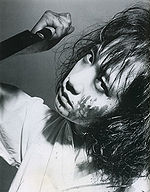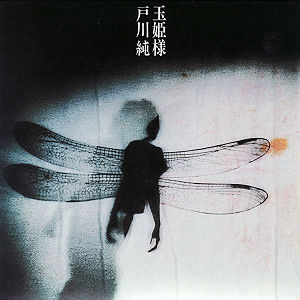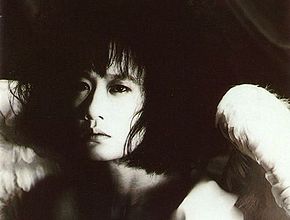Difference between revisions of "Tamahime-sama"
Pikirumuzu (talk | contribs) |
|||
| Line 39: | Line 39: | ||
; Information | ; Information | ||
| + | [[File:Togawa tama.jpg|thumb|150px|[[Togawa Jun]] promoting the album]] | ||
<div align="justify"> | <div align="justify"> | ||
| − | ''Tamahime-sama'' is the debut studio album released by [[Togawa Jun]]. The album is Togawa's first solo work outside of her bands. This album was co-produced by Togawa and | + | ''Tamahime-sama'' is the debut studio album released by [[Togawa Jun]]. The album is Togawa's first solo work outside of her bands. This album was co-produced by Togawa and Yoshifumi Iio. The [[Tamahime-sama (song)|title track]] was composed by [[Hosono Haruomi]], the bassist for [[YMO]]. The album recieved several reissues, with the latest being after she was picked up by [[Sony Music Entertainment]] in 2006. The Japanese music magazine, ''[[Rolling Stone Japan]]'', rated the album as "the 18th greatest Japanese album of all time<ref>[http://www.jrawk.com/Content/T/togawajun/reviews/tamahimesama.html Jrawk: Review of Tamahime-sama]</ref>." The album has been described as very theatrical and dark, and it contains a large range of musical styles such as electronic to traditional folk, which are often all used in the same song. The cover of the album fetures Togawa as a dragonfly. During promotional events such as photographs and live performances of songs from the album, Togawa wore dragonfly wings. |
The album reached #14 on the weekly [[Oricon]] chart, during it's original run. The only reissue of the album to chart was Sony's 2006 reissue, which reached #234 on the weekly [[Oricon]] chart. | The album reached #14 on the weekly [[Oricon]] chart, during it's original run. The only reissue of the album to chart was Sony's 2006 reissue, which reached #234 on the weekly [[Oricon]] chart. | ||
| Line 46: | Line 47: | ||
==References== | ==References== | ||
| − | |||
{{Reflist}} | {{Reflist}} | ||
Revision as of 22:29, 3 August 2012
- Artist
- Togawa Jun
- Album
- Tamahime-sama (玉姫様; Princess Tama)
- Released
- 1984.01.25 (LP)
- 1984.03.25 (Cassette)
- 1984.09.25 (CD)
- 1987.03.25 (CD reissue)
- 1993.08.21 (CD reissue)
- 1994.12.21 (CD reissue)
- 1996.12.18 (CD reissue)
- 2006.02.22 (CD reissue)
- Catalog Number
- YLR-28014 (LP)
- YLC-28014 (Cassette)
- 38XA-22 (CD)
- 32XA-149 ('87 reissue)
- ALCA-512 ('93 reissue)
- ALCA-9125 ('94 reissue)
- ALCA-5126 ('96 reissue)
- MHCL-712 ('06 reissue)
- Price
- ¥2,310 ('06 reissue)
- Tracklist
- Doto no Ren'ai (怒涛の恋愛; Equal Romance)
- Teinen Pushiganga (諦念プシガンガ)
- Konchugun (昆虫軍; Military Insects)
- Yuumon no Giga (憂悶の戯画; Caricature of Distress)
- Tonari no Indojin (隣の印度人; The Next Indian People)
- Tamahime-sama (玉姫様; Princess Tama)
- Mori no Hitobito (森の人々; People of the Forest)
- Odorenai (踊れない; Don't Dance)
- Mushi no Onna (蛹化の女; Pupating Woman)
- Information

Tamahime-sama is the debut studio album released by Togawa Jun. The album is Togawa's first solo work outside of her bands. This album was co-produced by Togawa and Yoshifumi Iio. The title track was composed by Hosono Haruomi, the bassist for YMO. The album recieved several reissues, with the latest being after she was picked up by Sony Music Entertainment in 2006. The Japanese music magazine, Rolling Stone Japan, rated the album as "the 18th greatest Japanese album of all time[1]." The album has been described as very theatrical and dark, and it contains a large range of musical styles such as electronic to traditional folk, which are often all used in the same song. The cover of the album fetures Togawa as a dragonfly. During promotional events such as photographs and live performances of songs from the album, Togawa wore dragonfly wings.
The album reached #14 on the weekly Oricon chart, during it's original run. The only reissue of the album to chart was Sony's 2006 reissue, which reached #234 on the weekly Oricon chart.
References
External Links
- Japanese Wikipedia: 玉姫様
- Sony Music Profile: 2006 Reissue
- Oricon Profile: 1993 Reissue | 1994 Reissue | 2006 Reissue
| |||||||||||||||||||||||||||||||||||

